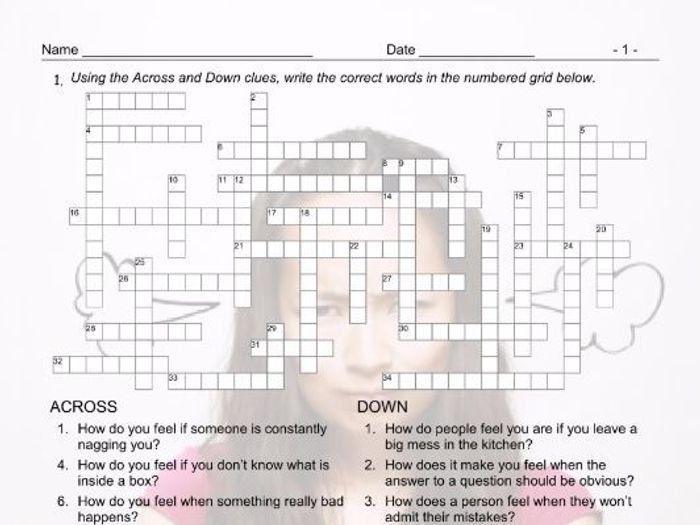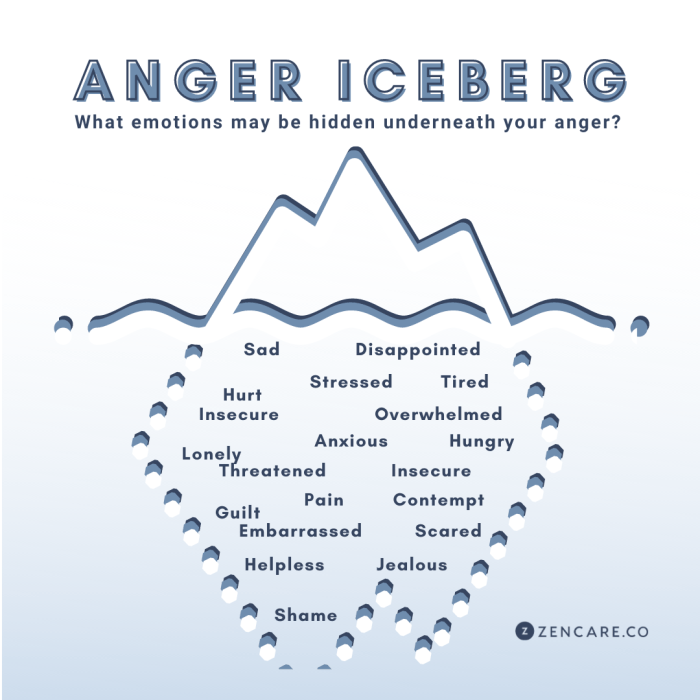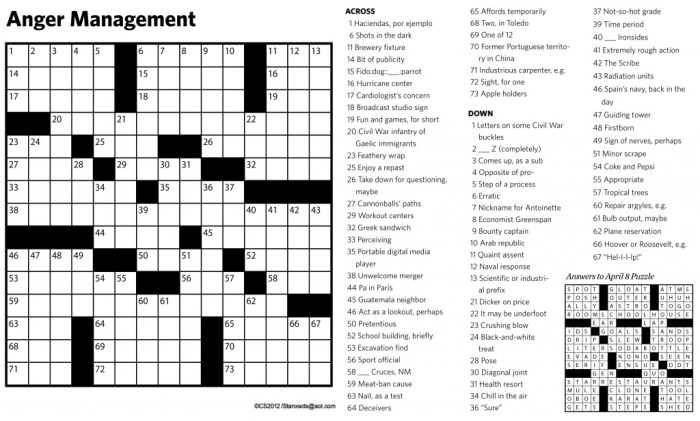Crossword puzzle feelings underlying anger answers – Crossword puzzles, beloved for their intellectual stimulation, can surprisingly evoke feelings of anger in solvers. This article delves into the emotional connection between crossword puzzles and anger, exploring the psychological reasons behind this phenomenon and offering strategies for managing anger while solving these mind-bending puzzles.
We will examine specific crossword puzzle clues that can trigger anger, discuss the impact of puzzle design on anger levels, and explore the cultural and social factors that contribute to crossword puzzle-induced anger. Additionally, we will highlight the emotional benefits of crossword puzzles, such as a sense of accomplishment and improved cognitive function.
Crossword Puzzle Feelings Underlying Anger
Crossword puzzles, beloved by many for their mental stimulation and entertainment value, can also evoke a surprising emotion: anger. While solving crossword puzzles can be a rewarding experience, it can also trigger feelings of frustration, irritation, and even rage in some individuals.
This article explores the complex emotional connection between crossword puzzles and anger, examining the psychological reasons why anger may arise during puzzle solving and discussing strategies for coping with these emotions.
Identifying the Feelings Underlying Anger
The emotional connection between crossword puzzles and anger stems from several psychological factors. Firstly, crossword puzzles can be challenging, and the inability to solve a clue can lead to feelings of frustration and inadequacy. This frustration can manifest as anger, especially if the solver has invested significant time and effort into solving the puzzle.
Secondly, crossword puzzles often contain clues that are ambiguous or misleading. This can lead to solvers feeling confused and frustrated, which can again trigger anger. In some cases, the anger may be directed at the puzzle creator, who is perceived to be deliberately trying to deceive or frustrate the solver.
Finally, crossword puzzles can be a competitive activity. Solvers may compare their progress to others, and this can lead to feelings of envy or resentment if they feel that they are not performing as well as they would like. This competitive element can also contribute to the development of anger.
Here are some examples of specific crossword puzzle clues that can trigger anger:
- Clues that are too vague or general, leaving the solver with too many possible answers.
- Clues that are misleading or contain hidden meanings, making it difficult to determine the correct answer.
- Clues that require specialized knowledge or obscure vocabulary, which can make them inaccessible to some solvers.
Coping with Anger while Solving Crossword Puzzles
While it is normal to experience anger while solving crossword puzzles, it is important to develop strategies for coping with these emotions in a healthy way. Here are some tips:
- Take a break from the puzzle if you feel yourself getting angry. Go for a walk, listen to some music, or do something else that will help you to relax.
- Try to approach the puzzle with a positive mindset. Remember that crossword puzzles are meant to be enjoyable, and there is no need to get stressed out if you can’t solve every clue.
- Don’t be afraid to ask for help from a friend or family member if you are stuck on a clue. Sometimes, a fresh perspective can help you to see the answer that you have been missing.
Exploring the Emotional Benefits of Crossword Puzzles

While crossword puzzles can sometimes trigger anger, they can also provide a number of emotional benefits. Solving crossword puzzles can give you a sense of accomplishment and satisfaction when you finally solve a difficult clue. It can also help to improve your memory and problem-solving skills.
Additionally, crossword puzzles can be a great way to socialize with friends and family.
Here are some anecdotes and research findings on the emotional well-being associated with crossword puzzle solving:
- A study published in the journal “Neurology” found that people who regularly solve crossword puzzles have a reduced risk of developing dementia.
- A study published in the journal “The Gerontologist” found that crossword puzzle solving can help to improve cognitive function in older adults.
- A study published in the journal “Psychiatry Research” found that crossword puzzle solving can help to reduce stress and anxiety.
Crossword Puzzle Design and its Impact on Anger: Crossword Puzzle Feelings Underlying Anger Answers

The design of crossword puzzles can also influence the level of anger experienced by solvers. Puzzles that are too difficult or that contain too many ambiguous clues can be more likely to trigger anger than puzzles that are more accessible and straightforward.
Here are some examples of crossword puzzle designs that minimize or maximize anger:
- Puzzles that have a clear theme or structure can be less frustrating than puzzles that are more random or disorganized.
- Puzzles that use clear and concise language can be less confusing than puzzles that use vague or ambiguous language.
- Puzzles that provide multiple ways to solve a clue can be less frustrating than puzzles that have only one possible answer.
Cultural and Social Aspects of Crossword Puzzle Anger

The cultural and social context in which crossword puzzles are solved can also influence the level of anger experienced by solvers. In some cultures, crossword puzzles are seen as a competitive activity, and this can lead to feelings of envy or resentment if solvers feel that they are not performing as well as they would like.
In other cultures, crossword puzzles are seen as a more relaxed and social activity, and this can lead to less anger and frustration.
Here are some insights into how crossword puzzle communities handle and address anger:
- Some crossword puzzle communities have rules in place to prevent solvers from becoming too angry or competitive.
- Other crossword puzzle communities have moderators who can help to resolve disputes and keep the community civil.
- Some crossword puzzle communities provide support to solvers who are struggling with anger or frustration.
Commonly Asked Questions
Why do crossword puzzles sometimes make people angry?
Crossword puzzles can trigger anger due to psychological factors such as frustration, perfectionism, and the challenge to one’s cognitive abilities.
How can I manage anger while solving crossword puzzles?
To manage anger, approach crossword puzzles with a positive mindset, take breaks when needed, and seek support from fellow solvers or online communities.
What are the emotional benefits of crossword puzzles?
Crossword puzzles provide a sense of accomplishment, improve memory and problem-solving skills, and can contribute to overall emotional well-being.